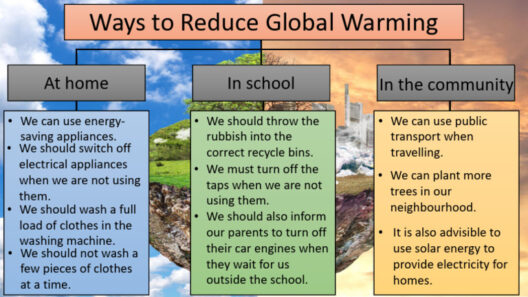In contemporary society, the kitchen has become a nexus of culinary creativity as well as an inadvertent contributor to global warming. As we navigate through our daily routines, we often overlook the environmental impact of our kitchen appliances. This discussion will scrutinize various common appliances, elucidating their roles in exacerbating climate change, and subsequently, how we might mitigate their pernicious effects.
Understanding Energy Consumption
It is imperative to grasp that the majority of household emissions stem from energy consumption, primarily derived from fossil fuels. The appliances we use daily—from refrigerators to ovens—consume significant amounts of electricity. The source of this electricity often dictates the carbon footprint associated with its use. For instance, appliances powered by coal-generated electricity have a more substantial impact than those utilizing renewable energy sources.
The Refrigerator: An Iceberg of Emissions
The refrigerator is a quintessential household appliance. It operates continuously, maintaining low temperatures to preserve food. However, this 24/7 energy utilization results in a staggering cumulative emission of greenhouse gases. Particularly, older models can consume vast amounts of energy due to inefficient technology. Also, the refrigerants used in these appliances, specifically hydrofluorocarbons (HFCs), are potent greenhouse gases—having a global warming potential thousands of times greater than carbon dioxide. Thus, upgrading to an Energy Star-rated refrigerator can alleviate both energy consumption and harmful emissions.
The Oven and the Cooktop: Heat with Consequences
When you preheat your oven or boil water on the cooktop, you release not just heat but also emissions, primarily if you are using gas. Gas-burning appliances emit carbon dioxide during combustion. Although they may be efficient for cooking, they contribute to the cumulative carbon footprint. Electric stoves, while generally less efficient than gas in terms of cooking speed, can significantly reduce greenhouse gas emissions when powered by renewable energy sources. Opting for induction cooktops, which transmit energy with high efficiency, represents a step toward a more sustainable kitchen.
The Dishwasher: Convenience or Catastrophe?
Dishwashers herald the convenience of rhythmic domesticity; however, they too can be significant contributors to environmental degradation. Citing studies, the average dishwasher consumes an impressive amount of water and energy. Operating a dishwasher with older washing mechanisms may yield higher energy consumption. Modern dishwashers, especially those boasting “eco-mode,” use considerably less water and energy per cycle. Thus, utilizing them efficiently can yield dramatic reductions in one’s carbon footprint.
Small Appliances: The Often-Overlooked Suspects
Let us not forget the plethora of small appliances—blenders, microwaves, coffee makers—that proliferate our countertops. With each use, they consume energy, albeit in smaller quantities. Collectively, their use can culminate in notable energy consumption over time. Multiplying their environmental impact is the tendency to use these devices inefficaciously. For example, leaving a blender plugged in when unused can waste energy unnecessarily. Implementing energy-saving habits, such as unplugging devices when not in use, can mitigate these detrimental effects.
Cooking Techniques: Methods Matter
How we engage with our kitchens also plays a pivotal role in our environmental footprint. Cooking methods, from traditional baking to rapid sautéing, have differing efficiencies. Employing methods that conserve heat and time—like pressure cooking or slow-cooking—can result in reduced energy demands. Moreover, being mindful of portion sizes and preparing meals that incorporate leftovers can ensure optimal energy use across the appliance spectrum.
Implications of Food Waste: A Broader Perspective
No discussion about kitchen efficiency is complete without addressing food waste. The environmental toll of food that is discarded is profound. Decomposing organic matter in landfills emits methane, a greenhouse gas with an unmistakable virulence in climate change. Reducing waste through smart meal planning and proper usage of leftovers directly influences the energy profile of our kitchens. In tandem, composting can present a viable alternative to traditional waste disposal, fostering an eco-friendly mindset around food management.
Awareness and Action: A Call to Sustainable Practices
Ultimately, the journey to transforming our kitchens into eco-friendlier spaces necessitates awareness and action. Educating oneself about the energy efficiency of appliances, consciously reducing usage, and embracing alternative cooking methods are foundational steps in battling climate change. Wherever possible, investing in modern, energy-efficient appliances can cultivate a more sustainable lifestyle. Moreover, pursuing renewable energy options for powering these appliances will only amplify positive changes, thereby aiding in the monumental quest to mitigate global warming.
The Path Ahead: A Collective Responsibility
The kitchen, often perceived as an innocuous space filled with the comfort of daily rituals, holds considerable sway over our environmental impact. By identifying and addressing the kitchen culprits that contribute to global warming, we may pave the way for conscientious culinary practices. Every action, no matter how small, has the potential to build toward a larger collective impact—ensuring that our kitchens serve not only nourishing meals but also a healthier planet for generations to come.








